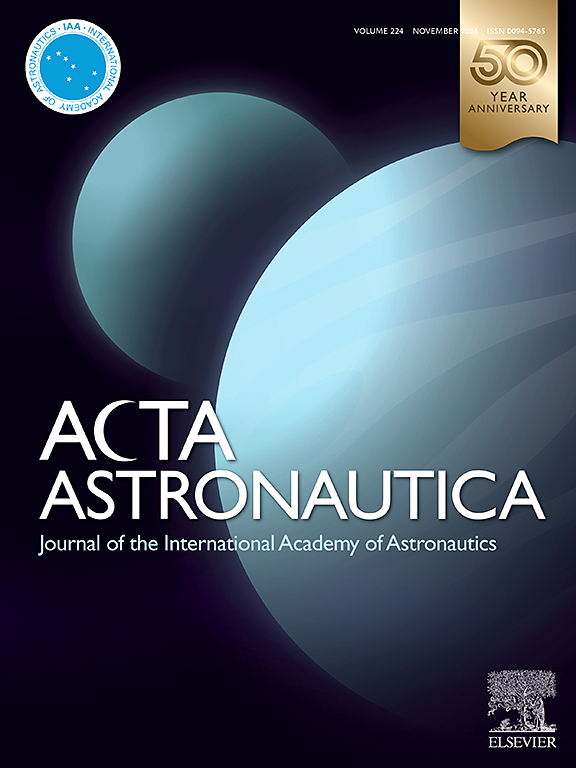Fast recovery mode for micro-meteoroid impacts: A LISA mission study
IF 3.1
2区 物理与天体物理
Q1 ENGINEERING, AEROSPACE
引用次数: 0
Abstract
This article studies and provides a plausible solution to address the effects of micro-particle impacts on the LISA mission. The influence of these undesired events are analysed using a set of 8 worst-case impact conditions from an ESA database of more than 200,000 impacts that captures the anticipated micro-meteoroid environment that the LISA spacecraft may encounter in a span of its envisioned 6.5 years of mission. Based on the results of this analysis, a novel operational mode called SCIHOLD is proposed to provide fast recovery from micro-meteoroid impacts. The performance of the SCIHOLD mode is validated using a LISA high-fidelity, non-linear simulator in two steps. Firstly, the identified 8 worst-case impacts are evaluated in nominal and dispersed conditions in a Monte Carlo campaign, and secondly, larger impacts beyond the ones in the database are simulated to assess the recovery limits of the proposed recovery mode. The results show that the proposed operational mode is successful in recovering the LISA spacecraft from the impacts, and most importantly, that this is achieved with a mean overall recovery time of 92.5 s, a considerable reduction compared to a full re-acquisition scenario typically lasting hours.
微流星体撞击的快速恢复模式:LISA任务研究
本文研究并提供了一个可行的解决方案,以解决微粒撞击对LISA任务的影响。这些意外事件的影响是用ESA数据库中超过20万次撞击的一组8种最坏的撞击条件来分析的,这些撞击捕获了LISA航天器在其预期的6.5年任务中可能遇到的预期微流星体环境。基于这一分析结果,提出了一种新的操作模式,称为SCIHOLD,以提供微流星体撞击后的快速恢复。利用LISA高保真非线性模拟器分两步验证了SCIHOLD模式的性能。首先,在蒙特卡罗运动中对所确定的8种最坏情况影响进行了名义和分散条件下的评估,其次,模拟了超出数据库中影响的更大影响,以评估所提出的恢复模式的恢复极限。结果表明,所提出的操作模式成功地从撞击中恢复了LISA航天器,最重要的是,这是以平均92.5s的总体恢复时间实现的,与通常持续数小时的完全重新采集场景相比,这是一个相当大的减少。
本文章由计算机程序翻译,如有差异,请以英文原文为准。
求助全文
约1分钟内获得全文
求助全文
来源期刊

Acta Astronautica
工程技术-工程:宇航
CiteScore
7.20
自引率
22.90%
发文量
599
审稿时长
53 days
期刊介绍:
Acta Astronautica is sponsored by the International Academy of Astronautics. Content is based on original contributions in all fields of basic, engineering, life and social space sciences and of space technology related to:
The peaceful scientific exploration of space,
Its exploitation for human welfare and progress,
Conception, design, development and operation of space-borne and Earth-based systems,
In addition to regular issues, the journal publishes selected proceedings of the annual International Astronautical Congress (IAC), transactions of the IAA and special issues on topics of current interest, such as microgravity, space station technology, geostationary orbits, and space economics. Other subject areas include satellite technology, space transportation and communications, space energy, power and propulsion, astrodynamics, extraterrestrial intelligence and Earth observations.
 求助内容:
求助内容: 应助结果提醒方式:
应助结果提醒方式:


